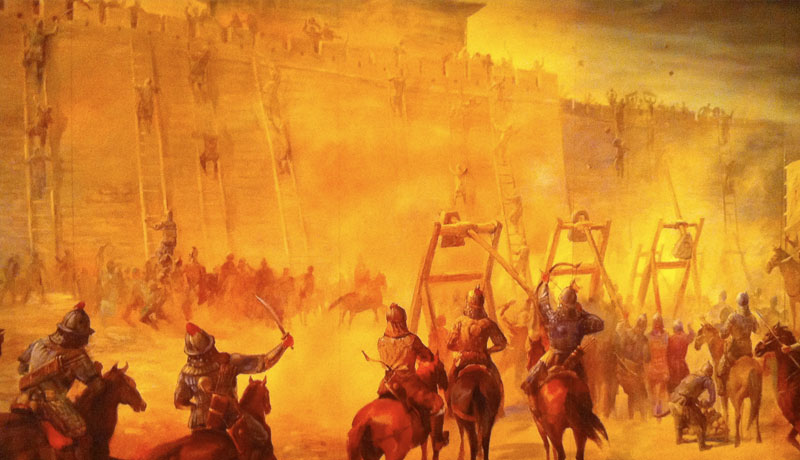During the 5th Century BCE, citizens of the tiny city-state of Athens, despite political turmoil at home and constant threats from abroad, achieved levels of accomplishment in art, architecture, philosophy and theatre not previously recorded. They also established a working democracy. The influence of their achievements on the development of human civilization continues to this day.
Friday, May 2, 2008
Herbst Theatre, 401 Van Ness Avenue, San Francisco
Moderator: Erich Gruen, Emeritus Professor of the Graduate School-Wood Professor, University of California Berkeley
Keynote Address Democracy, Innovation, and Learning
Josiah Ober, Tsakopoulos-Kounalakis Professor in honor of Constantine Mitsotakis and Professor of Political Science and Classics, Stanford University
Beginning with the Funeral Oration of Pericles in Thucydides, in which Pericles gives what seems at first glance to be an almost absurdly idealistic portrait of the democracy and the democratic citizen, Professor Ober will discuss how the design of democratic institutions helped to make that ideal into a lived reality – and thus to make Athens into the startlingly wealthy, powerful, and culturally forward-looking community that it was.
Lecture/Performance Staging the Past, Confronting the Present in Athenian Theater
Presented by Mark Griffith, Professor of Classics and of Theatre Dance and Performance Studies, UC Berkeley
The tragedies performed annually in the Theater of Dionysus (just below the Acropolis) were based on myths and characters of an earlier time — the era of the Trojan War and the Seven against Thebes. Playwrights adapted these stories so that they raised fresh issues of immediate and contemporary relevance to the Athenians sitting in the Theater: conflicts between family loyalty and political duty, the fragility of civilized values in the face of war and imperial conquest, and the psychological costs of the disenfranchisement and subordination of women. Since many of these issues are still with us, these plays continue to resonate with extraordinary power and immediacy among modern audiences. Professor Griffith will explore the exciting — and still troubling — dynamics of this unrivalled period of Western theater through illustrations of the original conditions and style of performance actually practiced in Periclean Athens, as well as with selected film-clips of scenes from modern productions of three of the most famous of these tragedies: The Oresteia, Antigone, and The Trojan Women.
Saturday, May 3, 2008
Herbst Theatre, 401 Van Ness Avenue, San Francisco
Lecture The Akropolis of Athens and its Impact
Margaret Miles, Professor of Art History, Classics, and Visual Studies, UC Irvine
In the whole sweep of western architectural history, surely the fifth century BCE stands out as the period upon which much else depends: when the buildings of the fifth century did not stand as exemplars, they were iconic of what was to be overturned or superseded. Although its roles have been shifting and various, and occasionally forgotten, the architecture of the fifth century still requires a response from current architects. Already by the time of the Roman Empire, the Parthenon and Erechtheum in Athens represented a long-past “golden age” and their styles were emulated in Rome as a hallmark of a new golden age. The refinements of architectural ornament and the sculptural decoration on the temples also inspired much later generations and set new standards in the early modern period. The Parthenon and its sculpture (even in its current location in the British Museum) continue as primary symbols of the achievements of Athens in the Periklean era.
Lecture War Is the Father of All: The Politics of War, Empire, and Freedom in Democratic Athens
Kurt Raaflaub, David Herlihy University Professor, Professor of Classics and History and Chair of Ancient Studies, Brown University
We think of fifth-century Athens as a “Golden Age” of greatness in culture and humanism, characterized by the Parthenon, Phidias’ sculptures, Sophocles’ tragedies, Aristophanes’ comedies, Herodotus’ Histories, and the emergence of Socrates’ philosophy. If we can trust the historian Thucydides, the contemporaries defined “greatness” by stunning victories in war, unprecedented imperial power, and unmatched liberty, all achieved by citizens uniquely committed, on the basis of a powerful civic ideology, to their community’s continuing military and political domination. Yet twenty-five years after Pericles’ death, starved and exhausted, Athens lost the Peloponnesian War and was almost destroyed. Professor Raaflaub will discuss the tensions and contradictions, so meaningful to our own time, inherent in Athens’ politics of war, empire, and freedom, their connection with democracy, and the reasons of Athens’ meteoric rise and fall in the fifth century BCE.
Performance Pythagoras Discovers Philosophy
George Hammond, San Francisco attorney and author
The intellectual influence of Pythagoras on Periclean Athens, and on modern culture, is hard to exaggerate. Known to Humanities West audiences for his presentations on Mark Twain and Plato, this time George dramatizes Pythagoras’s return home to Greece in 550 B.C. after years of educational travel in Babylon and Egypt.
Lecture Greece and Persia: A Clash of Cultures?
Erich Gruen, Emeritus Professor of the Graduate School – Wood Professor, UC Berkeley
The war between Greece and Persia in the early fifth century BCE has generally been interpreted as representing a mighty watershed in Hellenic history, a pivotal turning point in the self-perception of the Greeks by contrast with the great enemy. The outcome of the war (a Greek victory) provoked the “Orientalizing” of the Persian in Greek eyes, so it is said, a means to distinguish those who lived in freedom and democracy from the despised Iranians who lived contentedly under despotism, scorned liberty and preferred servility to rationality and self-determination. The lecture will explore the validity of this interpretation through two major 5th century texts, Aeschylus’ powerful play, “The Persians,” and Herodotus’ great history of the war itself.
Panel Discussion
Moderated by Erich Gruen
Presenters
Mark Griffith, Theatre, UC Berkeley
Eric Gruen, History, UC Berkeley
George Hammond, Philosophy, Humanities West
Margaret Miles, Classics, Archeology, UC Irvine
Josiah Ober, Classics, Stanford
Kurt Raaflaub, Classics and History, Brown University


